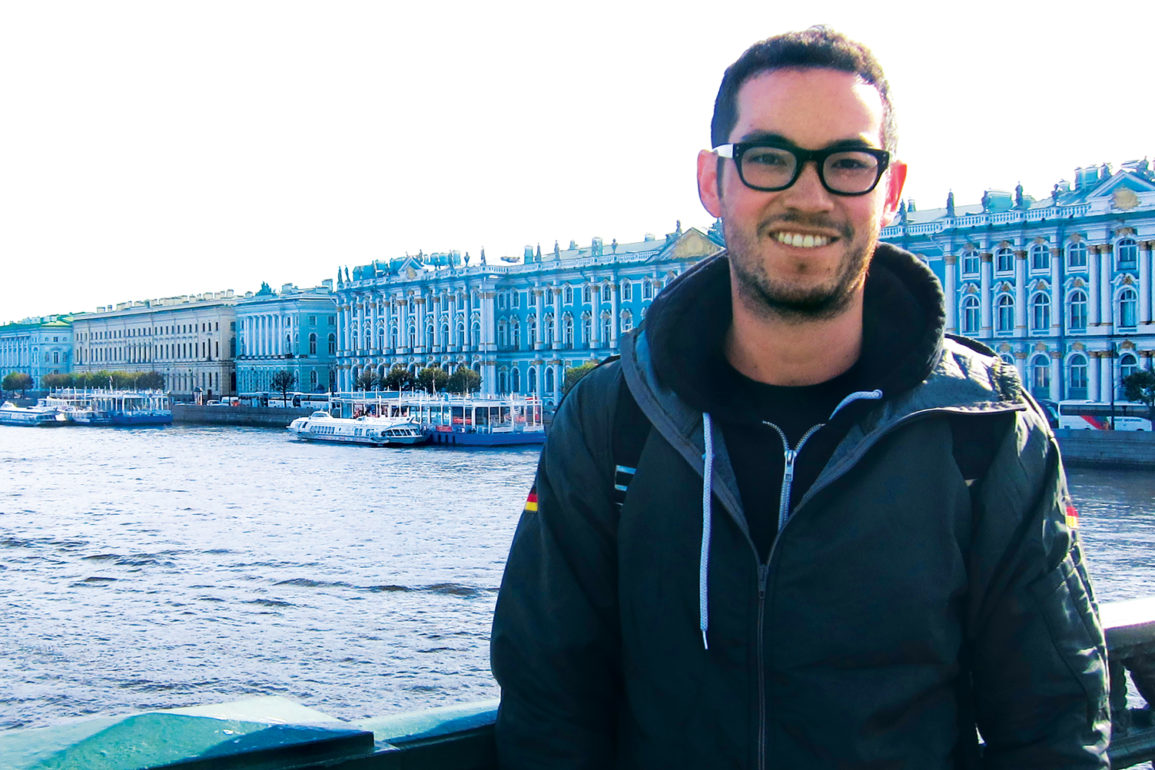Jerusalem, Tokyo and Budapest. These far-flung locations are home to alumni who have found their purpose thousands of miles from their Hawai‘i home. One a dancer, one an entertainer and the other a health services advocate, these three alumni have immersed themselves in new communities, and embraced new cultures and lifestyles, using their talents to make a difference on a global level. As cross-cultural understanding becomes vital to success, these global citizens model the skills necessary for students as they prepare to live and work in a global society.
The Advocate
By Camila Chaudron ’08
It’s safe to say that most Punahou alumni don’t have work obligations that take them to Tajikistan with colleagues from the United Nations, but Marcus Oda ’05 admits that he has always been “internationally focused.” As an advocate with the Eurasian Coalition on Male Health, a non-governmental organization based in Estonia, Oda works to promote access to health services for minority groups, such as LGBT and people living with HIV in Eastern Europe and Central Asia.
Not one to glamorize what he does, Oda is quick to point out that “human rights work is difficult,” and laments that his position as a legal researcher, program organizer and policy advocate doesn’t always allow him to see the direct impact of his work. Yet he is passionate about what he does: “I get to meet so many different kinds of people that I would have never met otherwise, people whose experiences are totally different from mine.”
Cue the recent trip to Tajikistan, where Oda traveled with the UN Population Fund to visit health centers where HIV positive gay men can receive services. “These centers have become more than clinics, they’re places where people can feel safe and make friends,” he explains. Experiences like these – traveling to remote locations, listening to people’s life stories – “help me better understand the work that I do. It’s very different to write a report, versus meeting individuals in person.”
The benefits of international travel are not foreign to Oda. Early exchange experiences as a student, including two transformative trips to France and Japan through the Wo International Center, made a big impact on him.
“At Punahou, we had so many opportunities that most people don’t have growing up,” he reflects. “Going abroad at a young age allowed me to feel comfortable being independent and working with people of very different backgrounds.”
Oda cites these critical skills and his linguistic studies as central to his education. Beginning in the seventh grade, Oda fell in love with français; he continued studying French through high school and college, where he ended up majoring in French literature at Yale University.
Now, Oda is a veritable polyglot: He is entirely bilingual in French and English, with working proficiency in Russian, and intermediate knowledge of both Hungarian and Italian. “Learning new languages has opened doors for me,” he says, “both professionally and culturally.” Much of his work is done in both Russian and English, and the Budapest-based lawyer also relies on his Hungarian to get around. And Italian? “Well, it wasn’t too difficult to pick up,” he says. Clearly, inquisitiveness is not Oda’s weakness. He is also an accomplished cellist, who loves playing tennis and watching foreign films in his free time.
And occasionally, a passion or interest, coupled with chance, blossoms into a career. Case in point: As a law school student at New York University, Oda began looking for summer internship opportunities abroad. The Russophile had hoped to land a position in Russia, but ended up at the Public Interest Law Network in Hungary, where he conducted legal outreach for non-governmental organizations. It was then that he saw he had an opportunity to impact real change in Eastern Europe. Rather than return directly to New York, he chose to continue his legal studies abroad that year and added a focus in human rights law.
Oda is intent on pointing out that it’s his intrinsic motivations that drive him. “Before, I might have done things because I thought I should,” he says, “but, it’s hard to be successful in a meaningful way unless you’re doing something that you love.” For instance, he admits that he “would be miserable working 80 hours a week at a corporate firm.”
Instead, Oda spends his days compiling legislative analyses and presenting his findings at international public health conferences, or advocating for greater patient access to resources before state delegates at the UN headquarters in Geneva, or organizing training sessions for LGBT advocates in Kyrgyzstan.
When asked about his outlook on the people he serves in the region, Oda gives a classic attorney answer: it depends, it’s complicated. “Often, Eastern Europe and Central Asia are considered a homogenous region because of their shared history, despite having very different realities,” he explains. “However, some former Soviet states are leaning more toward freedom, whereas other countries are moving in the opposite direction.” One thing is certain, though: “I am hopeful.”
See related profiles about Rachel Tina Horii ’87 Factor and Sumire Matsubara ’09.

